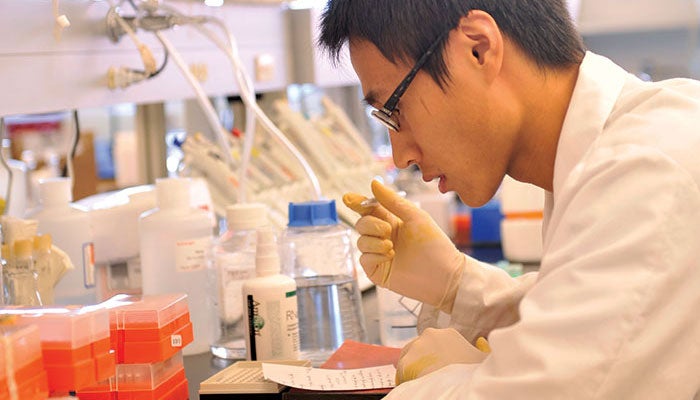Rensselaer has joined as a charter partner of Optum Labs, the collaborative research and innovation center founded by Optum and Mayo Clinic committed to improving the quality and value of patient care.
As a partner of Optum Labs, Rensselaer will have access to information resources, proprietary analytical tools and scientific expertise to help drive the discovery of new applications, testing of new care pathways, and other opportunities to drive innovation in wellness and care delivery.
“We live in a data-driven, globally interconnected world. The world is awash in data, and harnessing this data to advance health care and personalized medicine is one of the great challenges and opportunities of our time,” said President Shirley Ann Jackson, Ph.D. “We look forward to engaging the Institute’s world-class experts and unique research platforms with Optum Labs and its other partners to address many of the challenges in medicine and patient care.”

The partnership with Optum Labs provides an opportunity to help advance fundamental and translational research taking place at Rensselaer in the areas of drug discovery, human toxicology, and improved patient outcomes on a personalized basis.
“As the founding medical partner of Optum Labs, Mayo Clinic is excited to welcome the fresh insights and perspectives that new partners will bring to this collaboration,” said John Noseworthy, M.D., president and CEO of Mayo Clinic. “In addition to having access to large sources of clinical and claims information, all partners will now benefit from the unique viewpoints that others bring as we work to transform health care in the U.S. and truly meet the needs of patients in this country.”
“These additional charter partners will help Optum Labs accelerate the pace of innovation, paving the way for exciting new research initiatives that can be directly translated to improvements in patient care,” said Paul Bleicher, M.D., Ph.D., CEO of Optum Labs.
“Rensselaer is globally transforming biomedical research through the intersection of data science/analytics with biological sciences/bioengineering,” said Jonathan Dordick, Ph.D., vice president of research at Rensselaer. “Working with Optum Labs and the other partners, Rensselaer will forge a path from fundamental science to technology development that will result in innovation and discovery. The results of this new partnership will enable health care organizations to make better decisions, make better products, and ultimately, reduce costs of health care delivery.”
Optum Labs brings together a community of health care stakeholders dedicated to improving patient care by sharing information assets, technologies, knowledge, tools, and scientific expertise. Research is linked to the clinical environment through prototyping and testing in Optum and partners’ care settings, with a goal of achieving knowledge that improves health care delivery and patient outcomes.
The results of this new partnership will enable health care organizations to make better decisions, make better products, and ultimately, reduce costs of health care delivery.”—Jonathan Dordick
Dordick said the partnership with Optum Labs provides a significant opportunity to help advance fundamental and translational research taking place at Rensselaer in the areas of drug discovery, human toxicology, and improved patient outcomes on a personalized basis. Other areas of interest include drug repurposing, healthcare analytics, clinical outcomes predictions, and novel target identification.
The partnership with Optum Labs brings together two major research platforms at Rensselaer, the Center for Biotechnology and Interdisciplinary Studies (CBIS) and the Rensselaer Institute for Data Exploration and Applications (IDEA).
In addition to Rensselaer, Optum Labs announced six additional charter partners, representing a broad cross-section of health care stakeholders: American Medical Group Association, Alexandria, Va.; Boston University School of Public Health, Boston, Mass.; Lehigh Valley Health Network, Allentown, Pa.; Pfizer Inc. (NYSE: PFE), New York, N.Y.; Tufts Medical Center, Boston, Mass.; University of Minnesota School of Nursing, Minneapolis, Minn.
More than 20 major research initiatives are currently underway at Optum Labs, including studies that compare results from randomized clinical trials to analyses of observational data; the effectiveness of various medical devices; research into geographic variation in care patterns; and the most effective approaches to consumer engagement and treatment. Results from Optum Labs research will be shared through publications in scientific journals and presentations at professional meetings. Several projects are slated for publication in mid-2014.


